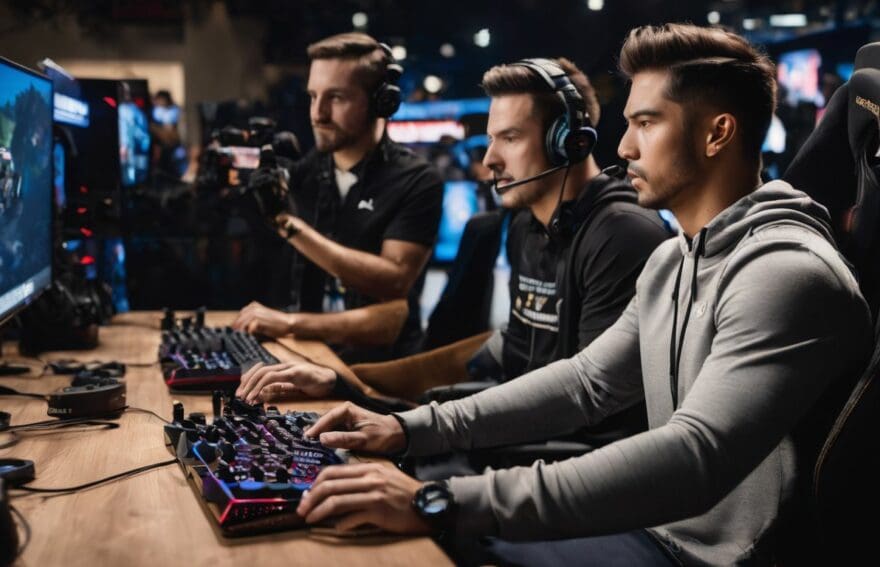The Role of Coaches and Mentors in Shaping Esports Talent

Updated On: November 18, 2025 by Aaron Connolly
As the world of esports soars to new heights within the realm of competitive gaming, the quest for that extra strategic advantage becomes more pressing. Indeed, guidance from those well-versed in the ins and outs of gaming can propel players into a league of their own — a sentiment echoed by a recent study spotlighting the invaluable experiences brought by professional coaches.
Our forthcoming blog post sets out to shine a light on how these dedicated tutors are meticulously crafting esports prodigies to scale ever-greater pinnacles of mastery and fair play.
Join us as we delve deep into this narrative, unveiling how coaching isn’t just transforming individual players but is also reshaping the landscape of sportsmanship within our vibrant virtual amphitheatre.
Let’s celebrate these unsung heroes who are nurturing talent and passion behind every digital triumph—shaping not merely champions, but legends in electronic arenas everywhere.
The Growing Demand for Esports Coaches
Esports coaching is becoming increasingly important in addressing toxic behavior, promoting inclusivity and respect within the gaming community. As the industry continues to expand, the demand for skilled mentors and coaches in esports is creating new career opportunities and fostering the development of children’s Esports leagues.
Addressing toxic behaviour
We tackle toxic behaviour head-on because it has no place in esports. Our coaches are equipped to handle instances of poor sportsmanship and guide players towards a mindset that prioritises respect, equity, and inclusion.
They focus on building an environment where every player can thrive, free from harassment and negativity.
By instilling these values early on, particularly in youth esports leagues, we lay the groundwork for a healthier gaming community. Our mentors lead by example, showing young gamers how to compete with integrity and celebrate diversity within the world of competitive gaming.
Their leadership makes sure that talent blossoms in a space where everyone feels valued and respected.
Expansive industry growth
As the need to address toxic behaviour in esports continues to gain attention, it is essential to recognise the expansive growth of this industry. Esports has witnessed a remarkable surge in popularity, leading to an increasing demand for skilled coaches and mentors.
The rapid expansion of children’s Esports leagues further signifies the growing recognition of esports as a legitimate and influential sector within the gaming community. This growth creates new career opportunities for aspiring coaches and mentors who are passionate about nurturing talent and shaping the future generation of gamers.
With this exciting progression, it is evident that the role of coaches and mentors in guiding esports talent will continue to play a pivotal role in the industry’s development.
Creating new career opportunities
Esports coaching is opening up new career paths for individuals passionate about gaming and leadership. The industry’s rapid expansion has led to a growing demand for professional coaches with expertise in strategy development, communication, and talent management.
As the esports landscape continues to evolve, there are increasing opportunities for aspiring coaches to carve out successful careers in guiding and shaping the next generation of gaming talent.
With an emphasis on mentorship, leadership skills, and player development, esports coaching presents a promising avenue for those looking to combine their love for gaming with a rewarding career path.
The emergence of children’s Esports leagues
Children’s Esports leagues are gaining traction, offering a platform for young gamers to showcase their skills and potential in competitive gaming. These leagues not only provide an opportunity for children to engage in healthy competition but also foster essential values of inclusivity, teamwork, and sportsmanship.
Coaches and mentors play a vital role in guiding these young talents, emphasising skill development alongside the importance of respect, fair play, and discipline. As demand for youth esports coaching continues to rise, it presents an exciting avenue for cultivating the next generation of skilled gamers while imparting valuable life lessons through mentorship and training programs tailored specifically for young players.
The Role of Coaches in Developing Esports Talent
Esports coaches play a crucial role in developing talent by guiding players, analysing team strategies, and providing mentorship. Click to read more about the impact of coaching on team performance and the future of coaching in esports.
Understanding the responsibilities of an Esports coach
Esports coaches are responsible for mentoring and guiding players, developing their skills, and fostering a positive team environment. This involves analysing top Esports team strategies to enhance performance.
An Esports coach also plays a vital role in addressing toxic behaviour by promoting inclusivity and respect among players. Additionally, they implement personalised training programmes to improve the overall performance and gameplay mechanics of each player.
Coaches use specific tools tailored to manipulate affordances within the esports environment to promote certain skills and abilities in players. They must have a comprehensive understanding of game mechanics, strategic prowess, analytical skills, and an ability to adapt to changing circumstances due to the constantly evolving nature of esports competition.
Analyzing top Esports team strategies
Studying top Esports team strategies provides valuable insights into the meticulous planning and coordination required for success. Analysing the gameplay manoeuvres, communication patterns, and tactical decisions of leading teams uncovers the nuanced approach to winning in competitive gaming.
Learning from these strategies helps players and coaches refine their own techniques, enhance team dynamics, and adapt to evolving trends within the esports landscape.
Examining top Esports team strategies reveals a multi-faceted approach that encompasses not only skillful execution but also effective teamwork, keen game sense, and adaptive decision-making.
Mentoring and guiding players
Coaches and mentors in esports play a vital role in shaping players into well-rounded professionals. They provide individualised guidance, helping gamers to improve their skills, navigate challenges, and stay motivated.
Effective mentorship involves cultivating a positive team culture, fostering strong communication, and teaching valuable life skills that extend beyond the gaming arena. Ultimately, the role of coaches and mentors is not just about honing gameplay techniques but also nurturing an environment where players can flourish both personally and professionally.
Guiding players towards success involves understanding each gamer’s unique strengths and weaknesses while providing tailored support. As mentors in professional gaming, we aim to inspire confidence in our players by fostering their talent while instilling important values such as sportsmanship and inclusivity.
The Impact of Coaching on Team Performance
Coaches play a crucial role in improving overall performance and gameplay mechanics of esports teams. They implement personalised training programmes tailored to each player’s strengths and weaknesses, but also face challenges such as managing team dynamics and addressing burnout.
Improving overall performance and gameplay mechanics
Implementing personalised training programmes is crucial to enhancing overall performance and gameplay mechanics. Coaches and mentors analyse the specific strengths and weaknesses of players, tailoring their approach to maximise individual skills.
By utilising advanced analytics and data-driven insights, coaches can identify areas for improvement in team strategies and gameplay techniques. This targeted approach ensures that each player receives the necessary guidance to refine their abilities, resulting in elevated performance levels across the entire team.
Fostering a culture of continuous learning and skill development is essential for refining gameplay mechanics in esports. Through mentorship, coaches instil discipline, strategic thinking, and effective communication within the team – traits that are vital for honing overall performance.
Implementing personalized training programs
- Improving aim and accuracy through targeted practice drills and exercises.
- Enhancing decision-making skills by simulating high-pressure in-game scenarios for players to navigate.
- Developing teamwork and communication through collaborative training sessions and team – building exercises.
- Refining game sense and strategic thinking through analysis of professional gameplay footage and guided discussions.
- Building physical and mental endurance with fitness regimens and stress management techniques.
- Cultivating emotional resilience and sportsmanship through mindfulness practices and conflict resolution training.
Challenges faced by Esports coaches
Esports coaches encounter numerous challenges in their role, including managing different player personalities and egos which can lead to team conflicts. Balancing the coaching responsibilities with personal time and self-care is crucial to prevent burnout and maintain a healthy work-life balance.
Keeping up with the rapidly evolving gaming strategies, updates, and new game releases requires continuous learning and adaptation to ensure effective coaching for players.
The competitive nature of esports presents challenges such as handling the pressure to consistently deliver positive results while nurturing talent within a highly demanding environment.
The Future of Coaching in Esports
Utilising advanced analytics and data-driven insights will play a crucial role in the future of coaching in esports. There is also potential for AI-assisted coaching and training tools to further enhance player development and performance.
Utilizing advanced analytics and data-driven insights
Coaches and mentors in esports are increasingly utilising advanced analytics and data-driven insights to enhance player performance and team strategies. By leveraging statistics and game data, coaches can identify players’ strengths and weaknesses, track their progress, and tailor training programmes to individual needs.
This approach allows for targeted skill development and strategic refinement to improve overall team performance.
Advanced analytics also provide valuable insights into opponent tactics, enabling coaches to develop counter-strategies that capitalise on the opponents’ weaknesses. By harnessing these data-driven insights, coaches are better equipped to guide players in making informed decisions during gameplay, ultimately elevating their competitive edge in the ever-evolving world of esports.
Potential for AI-assisted coaching and training tools
Utilising advanced analytics and data-driven insights allows coaches to understand the nuances of player performance, identify areas for improvement, and develop tailored training programs.
The potential for AI-assisted coaching and training tools opens up opportunities for more streamlined analysis, personalised feedback, and targeted skill development. These tools can augment a coach’s ability to track player progress, provide real-time feedback during gameplay, and offer individualised training plans based on each player’s strengths and weaknesses.
With AI assistance, coaches can optimise their strategies by leveraging comprehensive data sets to enhance team performance and nurture the talent of aspiring esports athletes.
Conclusion
The role of coaches and mentors in shaping esports talent is pivotal for the development of the next generation of gamers. They guide players to embrace values like inclusivity, fair play, and respect.
Coaches serve as strategic masterminds, mentors, and communicators who inspire and motivate esports athletes towards victory. Their comprehensive understanding of game mechanics and ability to instill important values are crucial for fostering a new era of skilled and disciplined gamers.
FAQs
1. What do coaches and mentors do for esports talent?
Coaches and mentors play a crucial role in player guidance, talent development, and offering esports career guidance to shape the skills of professional gaming enthusiasts.
2. How does coaching differ from mentoring in esports?
While both are important, coaching often focuses on specific techniques and team management for competitions, whereas mentorship involves long-term personal development like communication training and leadership skills in esports.
3. Can anyone become an esports mentor or coach?
To be effective in gaming mentorship or as a coach, one needs extensive knowledge of the game, understanding of coaching strategies in esports, and the ability to foster player development through tailored guidance.
4. What’s important about team management in esports?
Good team management requires clear communication training among members, coordinating players effectively during matches, and ensuring that each individual’s strengths contribute to the overall success of the team.
5. Why is talent development key in professional gaming?
Talent development ensures players receive comprehensive coaching techniques for ongoing improvement which can lead to successful careers by mastering complex game strategies under expert supervision from seasoned coaches or mentors.


